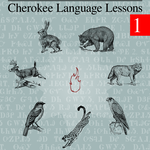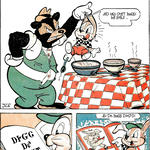
ᎦᏬᏂᏍᎬᎢ ᎠᎦᏔᎲᎢ (Grammar)
☞ Remember that it is through the exercises in the lesson material that you will learn how to understand and speak Cherokee, not by memorizing rules and word parts.
The following two new bound pronouns are used in this lesson.
-
They … me.
- ᎬᎩ̣-, ᎬᏆ͓- (gv²gị-, gv²gw-)
-
They … you.
- ᎨᏣ̣- (ge²jạ-)
